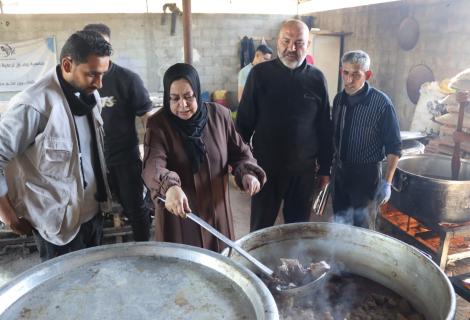Palestinian Women to Inspire Women of the world in Leading the Emergency Response to the Unprecedented Humanitarian Catastrophe in Gaza Strip

Gaza – Although women are disproportionately impacted by crises, they continue to be central in leading efforts in humanitarian response. Through ActionAid’s work , we promote women leadership in humanitarian response as women leaders are empowering women in context of emergencies and crisis and amplifying their voices . Buthaina is a woman leader who continues leading humanitarian response in Gaza after 7th of October 2023 and declaring the war and total blockade hindering the delivery of humanitarian aid in Gaza. Nearly 80% of the Gazan population is now displaced and living in severely overcrowded shelters that offer limited “refuge.” Civilians, humanitarian and medical staff and infrastructure continue suffering from continuous bombing and sever siege and health facilities are not functional due to damage or lack of generator fuel.
Gaza is currently the most dangerous place for women as Palestinian women in the besieged enclave have been enduring Israeli attacks, leading to death, injury, displacement, and detention, for the past six months amid a tightened blockade and unprecedent humanitarian catastrophe. They are grappling with hunger and limited access to basic facilities as they strive to care for their children amidst dire conditions. According to UN Women estimates, over 10,000 women have been killed to date, amongst them an estimated 6000 women who left 19,000 orphan children behind. Women who have survived have been displaced, widowed, and facing starvation. More than one million women and girls in Gaza have almost no food, no access to safe water, latrines, washrooms, or sanitary pads, with disease growing amidst inhumane living conditions.
Despite of these hard conditions, Palestinian women in Gaza continue playing leading roles in humanitarian responses, while women’s contributions and expertise largely go unnoticed and ignored. Women support their affected community by helping everyone including women, men, girls and boys to survive, cope with and adapt to these unprecedented conditions. The contribution of women as humanitarian actors needs to be recognized and supported as Buthaina’ s leadership. Buthaina represents a model of women leaders for humanitarian actions and responses in contexts of Crisis and wars . Buthania, Director of Wefaq Association, a partner with ActionAid which is responding to the crisis by providing basic needs such as hot food, clothing, dignity kits and health kits as well as psychosocial support to people experiencing trauma. In response to the deteriorating sanitary conditions, Wefaq have installed 60 WASH units across 20 shelters specifically for women and girls.
Women’s leadership in humanitarian response is needed to ensure that gender needs are addressed at all levels. Women are often responsible for the care and emotional rebuilding of communities during and in the aftermath of a crisis, and they often have strong local knowledge and links with others in the area where they live, which is a critical resource during humanitarian response.
Buthainah believes that Women’s leadership is necessary for effective humanitarian response as women are very close and familiar with the needs of their community and women. Leading a women organization in context of war needs to be the first one on the ground for taking responsibility for serving our community and women by assessing the needs, mobilizing funds, meeting with affected groups, meeting with relevant working organizations and supervising the implementation of the response actions .
Buthaina and her team continue their humanitarian work despite many challenges including continuous bombing and tightened blockade imposed on Gaza and limited humanitarian aid allowed to enter Gaza as Buthaina says “we are unable to respond to needs of all vulnerable groups needing services due to the limited aid, essential items and materials available inside the Gaza Strip entering through the Rafah crossing”.
Leading humanitarian response is not an easy work for women in context of Wars as Buthaina says: “We face big challenges in our work, especially for us as women, including going out and leaving our homes behind to provide humanitarian aid.’ “ In providing these services, we too live in a state of fear and tension. When we leave the house, we entrust our home and our children to God: only God knows if we will be returning to them”.
Continuous war and failure to reach full and permanent ceasefire in Gaza cause more stress and anxiety for aid workers, women and children. Buthaina says we suffer from anxiety. We can't sleep; we can't have sound, uninterrupted sleep. Our sleep is intermittent as a result of the fear we all feel living in the Gaza Strip. Fear haunts us in every step we take to provide humanitarian aid”.
In humanitarian crises, ActionAid works to promote women's leadership, ensuring women are empowered to make decisions about the needs of their community. We know that women bring vital skills, resources and experience to humanitarian response. And when crises happen, they are often the first responders, taking risks and playing critical roles in the survival of families and communities.
Background Information
ActionAid in Palestine (AAP) is a part of global federation working for social justice and gender equality and eradicate poverty in more than 45 countries around the world. AAP started its work in Palestine in 2007 to strengthen the resilience of Palestinian People as ActionAid believes that they should enjoy their rights to freedom, justice and self-determination. AAP implements a number of programs through its engagement with communities and women and youth groups seeking to empower them and enhance their influential civil and political participation to understand their rights and undertake collective activism to address the protracted rights violations resulting from the prolonged occupation of Palestine. AAP works simultaneously to enhance their leadership capacity and knowledge to practice their citizenship in holding authorities and other duty bearers to account.
For more information, please contact
Riham Jafari
Coordinator of Advocacy and Communication in Palestine
Mobile:
+972 (0) 595242890
Email: Riham.Jafari@actionaid.org